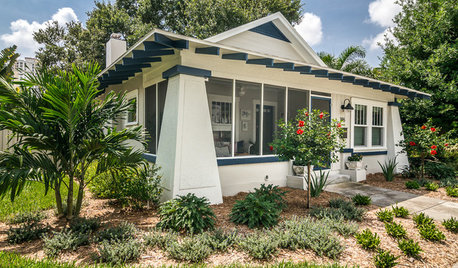Florida condo market
sushipup1
2 years ago
Featured Answer
Sort by:Oldest
Comments (34)
Related Discussions
HAVE: Eggplant: Florida Market, Little Prince
Comments (1)I have mini round eggplant for trade. Please let me know. Thanks...See MorePort City Farmers' Market, Pensacola, Florida
Comments (1)Thanks for posting this information -- I was down town on Saturday and wondered why the Port City Market was empty....See MoreAlready own or buying a condo in Florida?
Comments (3)I sure as heck think there is something wrong with this. It's one thing to lose your house/condo because you can 't make payments or you have to sell, but these people don't want to sell. The law should be amended to give these people some percentage of ownership of the condo association and allow them to remain in their units. I was renting an apartment in Maryland in 2007-2008 that was being turned into condos just as the bubble burst. The company that was selling the condos could not sell them at the price they wanted. They few people who had purchased their units were given a full refund....See MoreFlorida City Condo: will this Northern furniture work?
Comments (20)Lynn is right. Unless it has the name Pottery Barn, RH, etc the real good high quality names like you own don't mean much to the younger generation and these names get pennies on the dollar in the resale market and the older generation is buying new as they don't want what they had. And even the consignment shops are fussy as to what they accept as they know what will sell and what won't. If you don't want to mess with it, you may want to call a woman's shelter and see if they are interested in any of the pieces you may not take with you. I've done this before and when they are setting up women and their children in places of their own, they are interested as these women are starting over with nothing. I've even given them pots, pans, etc. And what is nice is that they came and hauled it all away so I didn't have to mess with it....See Moresushipup1
2 years agosushipup1
2 years ago
Related Stories

HOUZZ TOURSChic and Comfortable Florida Condo With Ocean Views
Designers choose decor with sparkling details and layer in neutrals and blues
Full Story
HOUZZ TOURSMy Houzz: A Bland Condo Gets Color and Personality
Flea market treasures and hints of vivid hues turn a nondescript pad into a stylish urban retreat
Full Story
VACATION HOMESMy Houzz: A Peaceful Florida Getaway for Michigan Snowbirds
A high-rise beachfront condo becomes a spacious and bright vacation haven with coastal style
Full Story
HOUZZ TOURSMy Houzz: Bright Island Style for a Florida Vacation Home
Hand-me-downs and new pieces mix happily in a midcentury home on a sunny South Florida island
Full Story
REMODELING GUIDESCoastal Makeover: A Florida Home Sees the Light
They're done! Check out the result of a ranch home that went from dark and dated to bright and airy — with a coveted water view
Full Story
TRANSITIONAL HOMESHouzz Tour: Would-Be House Flipper Falls Hard for a Florida Bungalow
An investment project winds up becoming home for a St. Petersburg, Florida, design enthusiast
Full Story
SMALL HOMESHouzz Tour: An Accessible Tiny-ish House in the Florida Palms
A builder creates a 600-square-foot dream home on the Gulf Coast for his father
Full Story
HOUZZ TOURSHouzz Tour: Step Inside (and Out) a New Florida Showhouse
2012 'New American Home' at International Builders Show celebrates latest materials and ideas for luxurious, indoor-outdoor living
Full Story
TRADITIONAL HOMESHouzz Tour: Lessons in Florida Cracker Style From a Vacation Home
This casual vintage home style is making a comeback. See the defining features up close in this relaxed house built for a crowd
Full Story
LIFECondo, Co-op, Townhouse, TIC — What's the Difference?
Learn the details about housing alternatives so you can make a smart choice when buying a home
Full Story



Elmer J Fudd